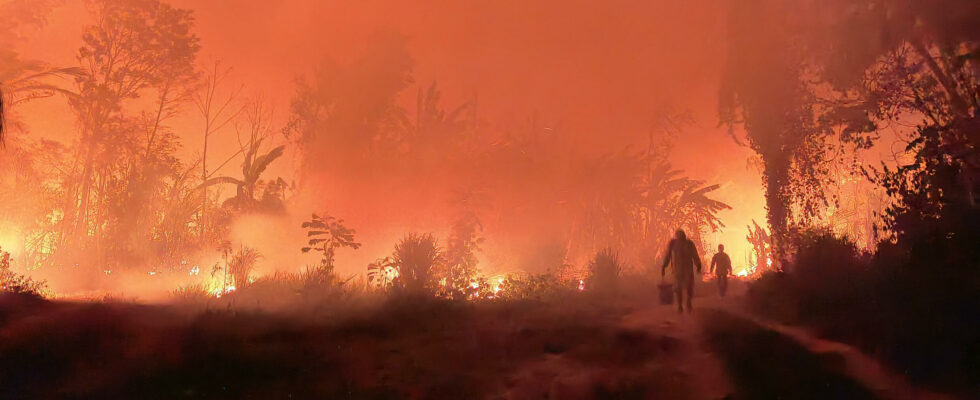In Bolivia, an unprecedented ecological disaster continues. This year, more than 10 million hectares of forests and agricultural land have been ravaged by flames. But these fires are not just the result of chance: controversial laws, called incendiary laws, indirectly encourage agricultural expansion at the expense of the Amazon.
4 mins
with our correspondent in La Paz, Camille Bouju
In Boliviawildfires have almost become a seasonal norm. In ten years, nearly 41 million hectares have been victims of fires.
In certain communities, the losses are colossal, such as in Quiquibey, in Madidi Park. “ Last year’s fires were severe. We have had losses of flora and fauna, crop losses, economic damage to communities because the products that have been burned cannot be recovered quickly… plantain for example or cassava », says Vincent Canare, farmer.
Also readBolivia: national emergency declared in the face of fires ravaging the country
“Incendiary laws” in support of agriculture
The country is therefore today faced with a real ecological disaster. And this in particular because of a series of laws promulgated since 2013 which allow land clearing, under the pretext of supporting agriculture, but without real ecological protection.
As a result, these texts favored the spread of fires, as Bolivian senator Cecilia Raquena explains. “ This policy responds to the vision that to produce more food in Bolivia, we must expand the agricultural frontier. And that also includes forests. These laws were not intended to encourage fires, but ultimately, directly or indirectly, we ended up promoting the expansion of arable land, by reducing penalties and generating incentives. »
Also readIn Bolivia, deforestation reaches peaks with the blessing of the government
There law 337 for example, by removing certain fines, has led to an increase in burning in the Amazon which, with prolonged droughts linked to climate change, often becomes uncontrollable.
For the inhabitants of the areas concerned, this is nonsense: this agricultural development tool contributes to massive deforestation and the impoverishment of the territory.
“ Strategic natural resources are affected. And one of the consequences of this destruction obviously concerns health, access to food, access to water and access to work, explains Alex Villca Limaco, environmental activist in Rurrenabaque. It also ends or jeopardizes the natural and cultural heritage of the Bolivian people. In the long term, people, unable to find food or the livelihoods they traditionally had, will be forced to move to larger cities. »
Also readBolivia: residents of Rurrenabaque fight against the flames that devour their land
This is demonstrated by Dario Mamio Serato, producer, who left San Buenaventura after seeing his cocoa fields go up in smoke before his eyes. “ For us it became very difficult. I had to go to another location to be able to start working again. »
A late “ecological break”
To curb fires this year, the government has introduced an “ecological pause” banning burning, with severe penalties involved. But for activists, like Alex Villca Limaco, this response is insufficient: he has been calling for the repeal of incendiary laws for ten years. “ The governments ofEvo Moralesof Jeanine Añez and the current government of Luis Arce have ignored the demands of the Bolivian people to modify and in some cases cancel these incendiary norms. The government must repeal these standards! »
Faced with this emergency, some communities affected by fires are exploring alternatives to traditional practices, such as reuse of land without burning.
In the community of Quiquibey, workshops are organized to raise awareness of the laws and adapt agricultural techniques in order to preserve their land. “ With what happened last year, we can’t afford for this to happen again, resumes Vincent Canare. So, we choose not to do any more burning. In some communities, this is already producing results, but we are working so that this can be extended to all communities, to maintain our forests. »
Torn between the imperative of agricultural expansion and environmental preservation, the future of Bolivia’s forests is uncertain. Communities are rebuilding in the hope that the incendiary laws will finally be called into question.
Also readIntensifying wildfires: a global climate catastrophe
